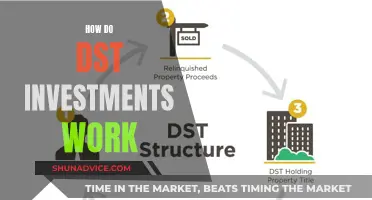
Whether to pay off your mortgage or invest a lump sum of money depends on your financial situation, tolerance for risk, and long-term goals.
Paying off your mortgage early can save you thousands of dollars in interest and give you peace of mind. On the other hand, investing can provide higher returns and help build your wealth.
If you have a low mortgage rate, investing may be a better option as you can potentially earn a higher rate of return. However, investing is riskier and there is no guarantee of returns.
Another option is to do both—pay off a large chunk of your mortgage early and invest the rest. This allows you to save money on interest and build equity in your home while still investing in your future.
Before making a decision, it is recommended to consult a financial advisor to help you assess your finances and long-term goals.
| Characteristics | Values |
|---|---|
| Pros of paying off mortgage | Save on interest |
| Peace of mind | |
| Build home equity | |
| More room in your budget | |
| Cons of paying off mortgage | Opportunity cost |
| Illiquid | |
| Loss of tax deductions | |
| Prepayment penalties | |
| Pros of investing | Higher rate of return |
| Liquidity | |
| Employer match | |
| Cons of investing | Risk |
| Not eliminating debt |
What You'll Learn

Paying off mortgage early: pros and cons
Paying off your mortgage early can be a good way to free up monthly cash flow and save money on interest. However, there are also some drawbacks to this strategy. Here are some pros and cons to help you decide if paying off your mortgage early is the right choice for you.
Pros of paying off your mortgage early:
- Interest savings: This is one of the biggest benefits of paying off your loan early. You could save thousands or even tens of thousands of dollars in interest payments.
- Peace of mind: If you don't like the idea of being in constant debt, paying off your mortgage early can ease your burden. In case of a financial emergency, you won't have to worry about missing mortgage payments and potentially losing your home to foreclosure.
- Build equity: Paying down your mortgage faster means building equity in your home more quickly, which can help you qualify for refinancing and save you money in the long run.
Cons of paying off your mortgage early:
- Opportunity cost: Any extra money you spend on paying down your mortgage faster is money that you could be investing in other financial goals, such as retirement savings or an emergency fund.
- Wealth is tied up: Property is an illiquid asset, meaning you can't quickly or easily convert it to cash. If you needed money in an emergency, you would have to sell your house, which could take time.
- Loss of some tax breaks: If you choose to pay down your mortgage instead of maxing out your tax-advantaged retirement accounts, you will miss out on those tax savings. You may also lose out on tax deductions for mortgage interest.
Ultimately, the decision to pay off your mortgage early depends on your financial goals and circumstances. Consult a financial planner or advisor to help you analyse your personal situation and determine the best course of action for you.
Choosing a Reliable Investment Firm
You may want to see also

Investing: pros and cons
Investing your money, rather than paying off your mortgage, has its benefits and drawbacks.
Pros
- Higher returns: The stock market has, historically, provided higher returns than paying off a mortgage early.
- Liquid investment: Money in stocks, bonds, and other market investments can be sold and accessed quickly if needed.
- Employer match: Investing in a retirement account may come with an employer match, which is additional free money.
- Low barrier to entry: You don't need a lot of money to start investing in stocks.
Cons
- Risk: There is a risk of losing money in the stock market. This is especially true if you don't know what you're doing.
- Volatility: The stock market is volatile and can be an emotional rollercoaster.
- Time: Investing in stocks takes time and research.
- Taxes: Profitable stock sales may be subject to taxes.
- Competition: You will be competing with institutional and professional investors.
- Increased debt: If you invest your money, you will still have debt to your name, and there is a risk of losing your home if you can't make the payments.
REITs: Why Aren't More People Investing?
You may want to see also

How to decide which option is best for you
Whether you choose to pay off your mortgage or invest depends on your financial situation and your tolerance for risk. Here are some factors to consider when deciding which option is best for you:
- Financial situation: Consider your income, expenses, and financial goals. If you have extra cash from a raise, bonus, or inheritance, you may want to invest it to grow your wealth. On the other hand, if you're carrying a lot of high-interest debt, such as credit card debt, it may be better to use the money to pay off those debts first.
- Risk tolerance: Paying off your mortgage is a risk-free investment as you know exactly how much money you will save. Investing in the stock market, on the other hand, comes with higher risks but also offers the potential for higher returns. Consider your risk tolerance and whether you are comfortable with the idea of potentially losing money in the stock market.
- Interest rates: Compare the interest rate on your mortgage with the potential returns on investments. If you have a low mortgage rate, it may not make financial sense to pay off your mortgage early when you could invest that money at a higher rate of return.
- Tax implications: Paying off your mortgage early can result in losing tax deductions for mortgage interest payments. Consult a tax advisor to understand the tax implications of both options.
- Peace of mind: If the idea of being debt-free is important to you, paying off your mortgage early can provide peace of mind and reduce your financial burden.
- Opportunity cost: Consider the opportunity cost of both options. Paying off your mortgage early means you won't be able to use that money for other financial goals, such as investing in retirement or building an emergency fund.
- Liquidity: Property is an illiquid asset, which means it can't be easily converted into cash. If you need quick access to cash, investing in stocks, bonds, or other liquid investments may be a better option.
- Retirement plans: If you're nearing retirement, paying off your mortgage early can reduce your monthly expenses and provide more financial security. However, if paying off your mortgage means you can't save as much for retirement, you may be better off investing instead.
- Consult a professional: Speak to a financial advisor or certified financial planner to help you understand your options and make a decision that aligns with your financial goals and risk tolerance.
The Workforce Investment Act: Funding Education for America's Future
You may want to see also

Alternatives for what to do with extra money
There are several alternatives to what you can do with extra money. Here are some options:
Create or build an emergency fund:
Having a financial cushion for unexpected events is always a good idea. You can put your emergency fund into a high-yield savings account to benefit from a higher interest rate while still having quick access to your money.
Pay off high-interest debt:
If you have extra money, consider using it to pay off any high-interest debt, such as credit card debt. By doing so, you can save yourself money in the long run by reducing the amount of interest you pay over time.
Invest in a retirement plan:
If you haven't already, consider investing in a retirement plan, such as a 401(k) or an individual retirement account (IRA). Contributing to a 401(k) can provide you with tax benefits, and many employers will match your contributions up to a certain amount. With an IRA, you can take advantage of tax-deferred growth or tax-free withdrawals in retirement, depending on the type of IRA you choose.
Invest in the stock market:
Investing in the stock market can provide higher returns than paying off a low-interest mortgage. However, it's important to remember that investing in the stock market comes with risks, and there is no guarantee of returns. Before investing, consider speaking with a financial advisor to assess your risk tolerance and investment options.
Refinance your mortgage:
If you have a high-interest mortgage, you may want to consider refinancing to take advantage of lower interest rates. This can help you reduce your monthly payments and save money over the life of the loan.
Save for other financial goals:
In addition to retirement, you may have other financial goals, such as saving for a down payment on a house or your children's education. Consider allocating some of your extra money towards these goals to help you achieve them faster.
The Crypto Conundrum: Navigating the Volatile World of Digital Currency Investments
You may want to see also

Factors to consider when deciding whether to invest or pay off a mortgage
Deciding whether to invest or pay off a mortgage early is a complex decision that depends on several factors. Here are some key considerations to help guide your decision:
- Risk tolerance: Paying off a mortgage early is generally considered a safer and more predictable option, as you know exactly how much you're saving. Investing, on the other hand, comes with the potential for higher returns but also carries greater risk. The stock market can be volatile, and you may lose money. Consider your risk tolerance and how comfortable you are with potential fluctuations in your investments.
- Financial circumstances: Assess your current financial situation, including your income, savings, and other debts. If you have high-interest debt, such as credit card debt, it's usually a good idea to prioritise paying that off first. Additionally, consider whether you have enough liquid assets to cover unexpected expenses. Paying off your mortgage early may leave you with less financial flexibility to handle emergencies.
- Interest rates: Compare the interest rate on your mortgage with potential investment returns. If you have a low-interest mortgage, investing your money may provide higher returns. However, if your mortgage has a high-interest rate, paying it off early can save you a significant amount of money.
- Retirement planning: If you're nearing retirement, paying off your mortgage early can provide peace of mind and reduce your monthly expenses. However, investing in retirement accounts or other investments may be a better option to grow your wealth and prepare for the future.
- Tax implications: In some cases, mortgage interest payments may be tax-deductible. Paying off your mortgage early could result in losing this tax benefit. Consult with a tax advisor to understand the tax implications of your decision.
- Opportunity cost: Consider the opportunity cost of both options. By investing your money instead of paying off your mortgage early, you may be able to generate higher returns and build wealth for the future. On the other hand, paying off your mortgage early frees up funds that can be invested or used for other financial goals.
- Emotional factors: Some people may feel uncomfortable carrying debt into retirement. While this is understandable, it's important to make financial decisions based on objective factors and the performance of your investments. Consult a financial advisor to help guide your decision and ensure it aligns with your financial goals.
Smart Ways to Invest $5,000 Today
You may want to see also
Frequently asked questions
The pros of paying off your mortgage include saving on interest, being debt-free, leveraging your equity, and freeing up funds for other investments.
The cons of paying off your mortgage include cutting into savings, missing out on potential tax deductions, and potentially paying prepayment penalties.
The pros of investing your money include potentially higher returns, increasing your future wealth, better liquidity, and the potential for an employer match.
The cons of investing your money include the risk of losing money, ongoing payments, and not making progress on your debts.
Other factors to consider include your financial situation, the interest rate on your mortgage, how close you are to retirement, your risk tolerance, and the opportunity cost of investing elsewhere.







